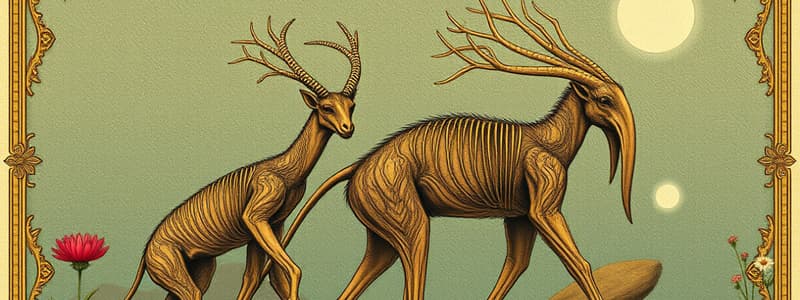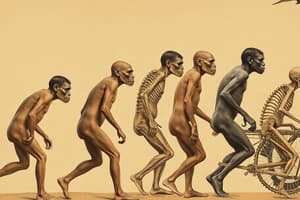Podcast
Questions and Answers
What major revolution began around 500 years ago that led to significant advancements in science?
What major revolution began around 500 years ago that led to significant advancements in science?
- Industrial Revolution
- Agricultural Revolution
- Technological Revolution
- Scientific Revolution (correct)
Current lifestyles reflect over 1% of human history.
Current lifestyles reflect over 1% of human history.
False (B)
What has significantly transformed human interaction and knowledge acquisition in recent years?
What has significantly transformed human interaction and knowledge acquisition in recent years?
the emergence and integration of computers and the Internet
The formation of villages, cities, and empires was made possible primarily due to the storage of _____ food.
The formation of villages, cities, and empires was made possible primarily due to the storage of _____ food.
Match the following innovations with their effects:
Match the following innovations with their effects:
Which species emerged approximately 2.8 million years ago?
Which species emerged approximately 2.8 million years ago?
Anatomically modern humans appeared around 200,000 years ago alongside at least six other human species.
Anatomically modern humans appeared around 200,000 years ago alongside at least six other human species.
What major discovery did early humans master about 1 million years ago?
What major discovery did early humans master about 1 million years ago?
The advent of _________ about 12,000 years ago revolutionized human survival strategies.
The advent of _________ about 12,000 years ago revolutionized human survival strategies.
Match the milestone with its corresponding time period:
Match the milestone with its corresponding time period:
What significant cognitive advancement occurred around 50,000 years ago?
What significant cognitive advancement occurred around 50,000 years ago?
All human species lived in complex societies by 300,000 years ago.
All human species lived in complex societies by 300,000 years ago.
What might have caused the extinction of the last non-modern human species?
What might have caused the extinction of the last non-modern human species?
Study Notes
Human History Overview
- The perception of normalcy in modern life masks a unique human history characterized by rapid development and sophistication.
- Humans have existed for about 200,000 years; prior to this, other human species coexisted, such as Homo erectus, which thrived for 2 million years.
Evolutionary Milestones
- 6 million years ago: Hominini tribe split, leading to a divergence from apes.
- 2.8 million years ago: Emergence of the genus Homo, representing the first humans.
- 200,000 years ago: Anatomically modern humans (Homo sapiens sapiens) appear alongside at least six other human species.
- The last non-modern human species disappeared around 10,000 years ago, with unknown causes—potentially resource competition or conflicts.
Development of Human Skills
- Early humans utilized tools for survival but made minimal progress until mastering fire about 1 million years ago.
- Controlled fire improved nutrition from cooked food, provided warmth and light, and facilitated hunting.
Lifestyle and Communication
- From 300,000 years ago, various human species lived in hunter-gatherer societies, using tools and preserving cultures.
- Early humans likely spoke a form of proto-language, enabling cooperation in small groups.
- A time-travel scenario suggests that behaviorally modern humans may date back only 70,000 years due to essential genetic adaptations.
Cognitive and Cultural Advancements
- 50,000 years ago: A paradigm shift in innovation and culture occurred, driven by advanced language allowing detailed communication and collaboration.
- Humans could rapidly expand, preserve knowledge, and build upon previous discoveries, contrasting with earlier information transmission methods reliant on genetics.
Transition to Agriculture
- 12,000 years ago: The advent of agriculture revolutionized survival strategies, enabling specialization among individuals.
- Farming allowed the storage of surplus food, fostering tighter communities and leading to the formation of villages, cities, and eventually empires.
Accelerated Progress and Innovations
- The Scientific Revolution began around 500 years ago, leading to major advancements across multiple scientific fields, followed by the Industrial Revolution.
- The emergence and integration of computers and the Internet have rapidly transformed human interaction and knowledge acquisition.
Modern Context and Reflection
- Current lifestyles represent less than 0.001% of human history, despite modern advances such as space exploration and advanced technology.
- The understanding of knowledge has vastly expanded, with today's average student knowing more about the universe than past scholars.
- A warning about the fragility of modern achievements invites reflection on the importance of appreciating life’s conveniences and not being overly concerned with minor inconveniences.
Human History Overview
- Modern life often obscures a profound human history marked by rapid advancements in society and culture.
- Humans have existed for approximately 200,000 years; earlier hominins like Homo erectus thrived for about 2 million years.
Evolutionary Milestones
- 6 million years ago: The Hominini tribe diverged from common ancestors with apes.
- 2.8 million years ago: The first members of the genus Homo emerged.
- 200,000 years ago: Anatomically modern humans (Homo sapiens sapiens) appeared alongside at least six other human species.
- The last non-modern human species went extinct around 10,000 years ago, likely due to resource competition or conflicts.
Development of Human Skills
- Early humans developed tools essential for survival, but significant progress wasn't made until the mastery of fire around 1 million years ago.
- Controlled fire enhanced nutrition through cooked food, provided warmth and light, and improved hunting strategies.
Lifestyle and Communication
- From 300,000 years ago, different human species lived as hunter-gatherers, creating and preserving diverse cultures.
- Proto-language likely emerged among early humans, facilitating cooperation within small groups.
- Behavioral modernity may trace back only 70,000 years due to crucial genetic adaptations.
Cognitive and Cultural Advancements
- 50,000 years ago: A significant cultural shift occurred, fueled by the development of advanced language, allowing detailed communication and collaboration.
- This innovation enabled humans to expand rapidly, preserve knowledge, and build upon past discoveries, enhancing information transmission beyond genetic reliance.
Transition to Agriculture
- 12,000 years ago: The rise of agriculture transformed human survival strategies, prompting specialization among individuals.
- Farming allowed for surplus food storage, leading to more cohesive communities and the emergence of villages, cities, and empires.
Accelerated Progress and Innovations
- The Scientific Revolution began around 500 years ago, spurring major advancements in various scientific disciplines, later followed by the Industrial Revolution.
- The creation and adoption of computers and the Internet have rapidly altered human interaction and the acquisition of knowledge.
Modern Context and Reflection
- Contemporary lifestyles represent a mere 0.001% of human history, despite significant achievements like space exploration and technological advancements.
- Today's average student possesses more knowledge about the universe than historical scholars due to expanded access to information.
- A cautionary perspective on the fragility of modern accomplishments highlights the need to appreciate life's conveniences while maintaining perspective on minor inconveniences.
Studying That Suits You
Use AI to generate personalized quizzes and flashcards to suit your learning preferences.
Description
Explore the fascinating journey of human history from the emergence of early hominins to the development of modern Homo sapiens. This quiz covers key evolutionary milestones and the development of crucial survival skills, such as tool use and control of fire. Test your knowledge on the remarkable advancements that have shaped humanity over millions of years.




